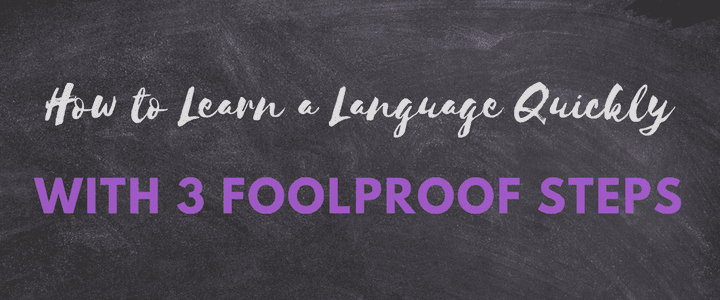Fact: a native Spanish speaker will have an easier time learning French than they would learning Japanese.
According to the U.S. Foreign Service Institute, one of the biggest factors affecting the speed of language acquisition is how different your target language is from your native tongue. Languages in the same “family” typically have similar alphabets and tones, making it easier to branch out as long as you stay within the same grouping.
No matter what language you’re learning though – whether it’s French, Korean, or Spanish – there are a few foolproof steps you can take to get fluent faster. Keep reading to find out how to learn a language quickly and effectively in three simple steps.
How to Learn a Language Quickly
Step 1: Find a Language Teacher
Yes, learning how to introduce yourself is important, but to quickly progress past the basics it’s highly beneficial to work with a language teacher. A language tutor can cater to your individual needs and learning style.
A teacher can also catch mistakes you’re making in pronunciation and help you work on your accent – something no app or software can do. Face time with a quality teacher gives you the personal attention you need to quickly master and move past concepts that are particularly challenging to you.
There are a few things to keep in mind when looking for the best language teacher for you. Here are some questions to ask about a prospective language tutor’s background:
- Did they study the language in college?
- Have they lived in a country where the language is spoken?
- Are they a native speaker?
- How much teaching experience do they have?
Answering each of these questions will help you narrow down your options. You should also consider a few logistics when looking for a teacher. Would you rather take online lessons or in-person? How often would you like to meet and when?
Many students find it beneficial to take hour-long lessons twice a week. Browse through the language teachers at TakeLessons to get the help you need to meet your language goals as quickly as possible.
SEE ALSO: 8 Questions to Help you Find the Right Private Teacher
Step 2: Practice. Practice. Practice.
To become fluent faster, you’ll need more than weekly lessons. It’s necessary to reinforce all you’re learning in lessons by practicing every day as much as you can. Constant practice throughout your day will help you successfully develop speaking, reading, and writing skills.
There are dozens of fun apps that can help you memorize common phrases quicker with games and quizzes. Use apps to brush up on your skills during your commute or on lunch breaks. Some even have a hands-free option to help you learn while driving.
Another way to learn quicker is to label items around your house with their names in your target language. Before you know it, you’ll be able to make shopping lists in your new language!
Here are a few more fun ways to take advantage of your free time and practice your target language throughout the day. Remember, it’s important to practice both with others and on your own.
- Read books and magazines in your target language
Step 3: Immerse Yourself
The final step you should take to learn a language quickly is to immerse yourself as much as possible – surround yourself with the language! There are a few incredibly easy ways to do this.
First, change the language settings on your phone and laptop. This will allow you to get familiar with everyday vocabulary and actually think in the language throughout the day.
Swap out your usual radio stations or shows and listen to music or watch movies in your target language. Experts agree that music aids memorization, and movies allow you to see and hear conversations in your target language. Put on the subtitles so you can follow along!
Another way to immerse yourself while practicing conversational skills is to find a language partner near you. Pick a time to meet up regularly and agree to only speak in your target language. If there isn’t anyone available locally, there are many online language partners to choose from.
If you have the resources, the best way to learn a new language is complete immersion. Any amount of time in the country of origin will be well worth the effort, as long as you make a commitment to speak only your target language with the locals. Being surrounded by the new language and forced to speak it will help you become fluent much faster.
Now you know how to learn a language quickly! How fast do you think you can pick up your new language? Be sure to set goals for yourself along the way that are SMART – specific, measurable, attainable, realistic, and time-bound.
Each of the steps mentioned above are fundamental to becoming fluent in a language and they should be done simultaneously for the best results. Here’s a quick recap:
- Take lessons from a private tutor to ensure you’re learning the best way possible
- Make practice a part of your daily routine
- Lastly, try to immerse yourself as much as possible
Follow these steps and you’ll be speaking like a native before you know it!
[pro_ad_display_adzone id=”74612″]
Natalie Hagen




